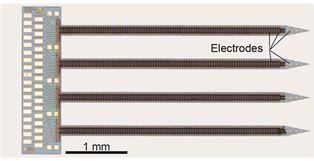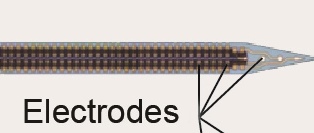New probes for connecting with the brain
8 March 2013
An international project, NeuroSeeker, aims to develop new probes to measure and analyse signals from individual neurons in the brain.
Launched in February 2013 the interdisciplinary project pools the expertise of ten partner institutions from Europe and Canada. The University of Freiburg will receive a grant of around €1.7 million from the EU to fund the project.
NeuroSeeker is an extension of the successful EU project NeuroProbes, which finished in 2010. The scientists are developing new probes for recording neural signals and stimulating optical tissue.


Example of a neural probe with 752
microelectrodes distributed
on four-millimeter-long shafts, like
those developed in the project NeuroProbes
The probes will thus be designed to measure and analyze the signals of individual nerve cells and their connections, and if necessary to optically or electrically stimulate nervous tissue. They will serve as instruments for basic neuroscientific research as well as for medical applications, for instance in the diagnosis of epilepsy.
The partner institutions are the research center Imec in Leuven, Belgium; the University of Parma, Italy; the Dutch universities Amsterdam and Nijmegen; and the University of Lethbridge, Canada. Other institutions contributing their expertise to the project are the Fundação Champalimaud from Portugal, the Max Planck Society from Germany, the Hungarian Academy of Science, and the joint IMTEK-Imec spin-off ATLAS Neuroengineering from Belgium.
NeuroSeeker will support the new Cluster of Excellence BrainLinks-BrainTools of the University of Freiburg with its competence in neurotechnology and brain-machine interfaces.